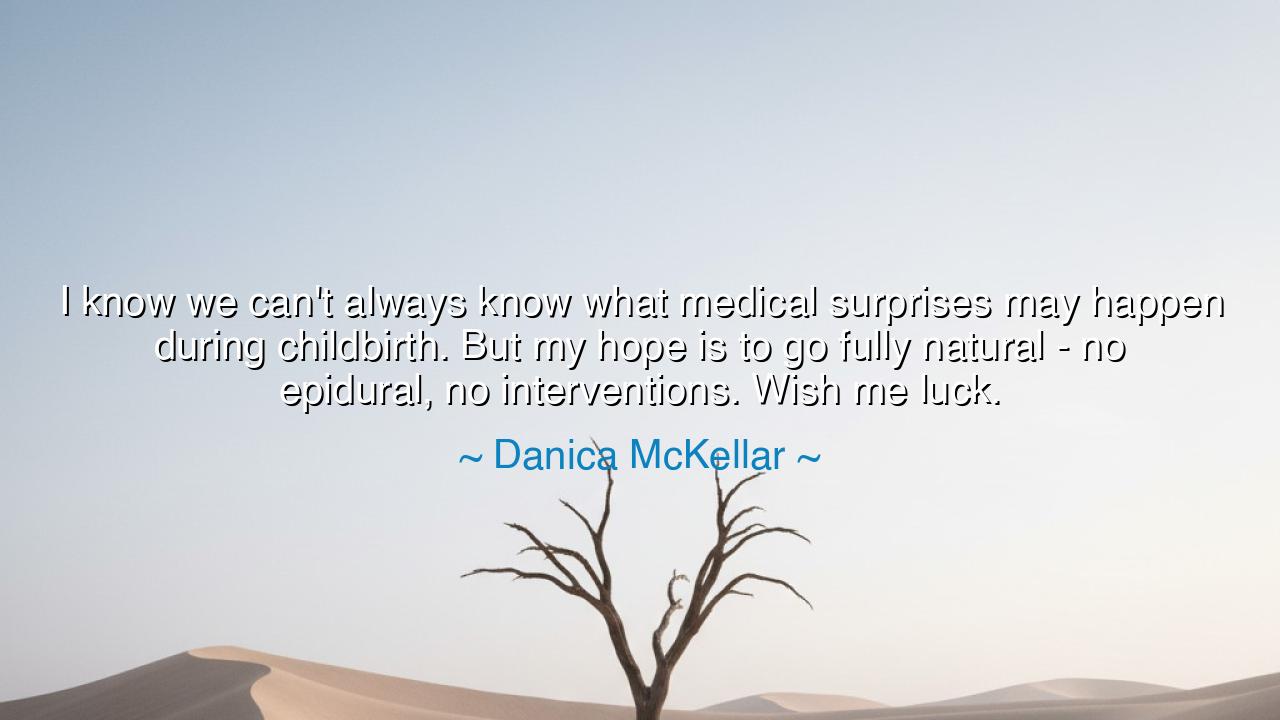
I know we can't always know what medical surprises may happen
I know we can't always know what medical surprises may happen during childbirth. But my hope is to go fully natural - no epidural, no interventions. Wish me luck.






In the tender yet resolute words of Danica McKellar, there breathes the ancient spirit of motherhood, courage, and surrender: “I know we can't always know what medical surprises may happen during childbirth. But my hope is to go fully natural — no epidural, no interventions. Wish me luck.” Though spoken softly, these words carry the strength of mountains and the humility of oceans. They reveal the eternal dance between control and faith, between the human will to endure and the wisdom to accept what the fates may bring. For childbirth — that most sacred threshold between life and life — has ever been both trial and miracle, both agony and triumph.
In this utterance, we see not defiance, but hope — the kind that glows quietly within the heart of every woman who dares to walk the ancient path of creation. McKellar acknowledges the limits of knowledge, the unpredictability of nature, and yet she steps forward with courage, seeking the purity of a natural birth, free of the numbing hand of intervention. Her words carry a reverence for the primal strength of the body, the deep and instinctive power that has brought forth generations before her. She seeks to meet that power face to face — not out of pride, but out of reverence for what it means to be human, to be alive, to be a vessel of new life.
The origin of these words lies not in rebellion against medicine, but in gratitude toward it — and in a desire to reconnect with the timeless strength that modern comforts often soften. McKellar speaks as a woman of her age, standing at the meeting point between the wisdom of science and the ancient intuition of the body. Her hope “to go fully natural” is not a rejection of modern knowledge, but an embrace of something older — the wisdom of trust, the surrender to nature’s rhythm that guided mothers for thousands of years before the first hospital was ever built. Yet in her humility, she also concedes the truth: that childbirth is unpredictable, and that sometimes even the strongest heart must yield to circumstance.
The ancients understood this paradox well. In the stories of Greek mothers and goddesses, childbirth was both blessing and ordeal. Even the immortal Leto, mother of Apollo and Artemis, suffered the pangs of labor under the open sky, forbidden a place to rest until the island of Delos rose from the sea to cradle her. Her pain was divine, her endurance eternal. So too in McKellar’s hope we hear that echo — the desire to experience the fullness of creation, to touch the mystery that lies between suffering and transcendence. It is not the absence of pain she seeks, but the presence of meaning within it.
Her words also reflect the eternal human yearning for authenticity — to feel life in its rawest form, to confront fear without barriers. In a world filled with devices that dull discomfort and distance us from the elemental, her wish “to go fully natural” becomes a kind of spiritual statement: that strength is not found in avoidance, but in presence. She wishes not merely to give birth, but to awaken — to become, through the crucible of pain, something greater, something elemental. And yet, she knows — as all wise souls do — that true courage lies not in denying help, but in accepting whatever must be, should the unforeseen arise.
There is a profound lesson here, one that reaches far beyond childbirth: life’s greatest acts of creation require both strength and surrender. Whether one is birthing a child, a dream, or a new self, the process is never entirely within our control. We prepare, we hope, we endure — and then, at the appointed hour, we must let go and trust the unknown. To live fully is to walk that narrow bridge between determination and acceptance, between effort and grace. It is to say, as McKellar says, “Wish me luck” — not as superstition, but as a prayer to the universe, a whisper that blends humility with faith.
And so, to those who hear these words, let them remember: pain and purpose often share the same womb. Do not fear the struggle, for it is the passage through which life renews itself. When your own trials come — whether in birth, in love, or in destiny — may you face them with the same balance of strength and surrender. Prepare yourself with wisdom, but leave room for mystery. Strive with all your heart, but bow when the winds of fate blow differently than you planned. For in the end, as McKellar’s words remind us, even amid uncertainty, courage is not the absence of fear — it is the decision to walk forward anyway, with faith in the unseen and reverence for the journey.






AAdministratorAdministrator
Welcome, honored guests. Please leave a comment, we will respond soon